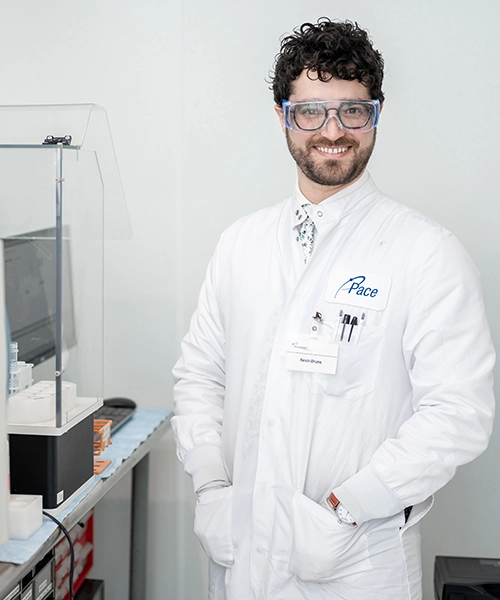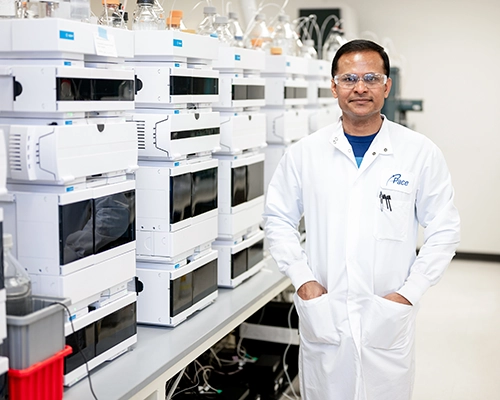Comprehensive Analytical Services
Analytical methods using an appropriate testing scheme are essential for the effective characterization and evaluation of pharmaceutical drug products. The data informs critical decisions about the safety, purity, and effectiveness of your products and materials. We offer a comprehensive selection of sources for analytical methods to support your testing needs, including compendial methods, methods developed internally with phase-appropriate validation, methods supplied to us from other labs, and an archive of owned laboratory methods.
Analytical Testing Support
We work with you to draft a custom validation protocol or follow supplied protocols to meet your needs for compliance with ICH and FDA guidelines. Our experience covers the spectrum of drug product development phases I, II, and III.
Complete heavy metal analysis to meet the latest EP and USP requirements by screening levels of elemental impurities in raw materials, in-process formulation, and finished drug and device projects. We provide accurate, quantifiable results with dedicated lab space for testing inorganic analytes, including elemental metals, anions, and cations.
- Drug-Excipient Compatibility Studies
- Differential Scanning Calorimetry (DSC)
- Powder X-ray Diffraction (XRD)
- Polarized Light Microscopy (PLM)
- Particle Size Analysis (LLS)
- Forced-Degradation Studies
- Solubility Determination (aqueous/solvents)
- Texture Analysis
- Bulk Powder Characterization
We customize protocols to for your product using the following parameters:
- Accuracy (at limit)
- Specificity
- Limit of Detection / Limit of Quantization
- Stability of Standard and Sample
We customize protocols to for your product using the following parameters:
- Instrument / Method Precision
- Accuracy
- Linearity / Range
- Specificity – Matrix Components
- Specificity – Forced Degradation Studies
- Method Robustness / Ruggedness
- Limit of Detection / Limit of Quantization
- Stability of Standard and Sample Solutions
- Intermediate Precision
Verification Procedures

Cleaning Validation
Confidently move your drug to market with our meticulous cleaning verification. We analyze surfaces for microscopic trace contaminants to ensure your processes maintain compliance.
Compendial Verification
We maintain a robust compendial verification program. National Compendial methods are verified according to the guidance chapters in the United States Pharmacopoeia (USP) General Chapter <1226>, and the corresponding chapters from the European Pharmacopoeia (JP) and Japanese Pharmacopoeia (JP). Our dedicated team includes Quality Assurance and Technical experts, who review monographs, perform risk assessments, execute verifications, and ensure results are documented in a verification protocol.
Analytical Method Management
Method Tech Transfer
When transferring methods into our lab, we follow specific method transfer protocol and United States Pharmacopoeia (USP) General Chapter <1224> guidance. Our team supports strategy selection, protocol drafting, transfer activities, and final summary reporting. We collaborate with you to select a choice strategy based on the method complexity, the method type (identification, qualitative limit test, quantitative assay, performance indicator, etc.), and the analytical technique (chromatography, spectroscopy, wet chemistry, etc.).
Method Life Cycle
Partner with our team for comprehensive support across the analytical method lifecycle. We provide guidance and support across every step of the process, including design, development, improvement, qualification, validation, transfer, and maintenance.

APPLIED VALIDATION GUIDANCE
we follow USP General Chapter <1225> guidance and ICH guidelines to ensure compliance.
In a comparative testing study, two or more laboratory locations test samples are selected from a homogenous set. The testing is completed independently within a reasonable contemporary time period, and then the results are compared and must be within predefined acceptance criteria. We carefully determine the number of samples tested and the acceptance criteria to ensure the significance of the comparative data sets and the successful demonstration of capability in the receiving laboratory.
In a co-validation, two or more laboratory locations complete experiments included in the method validation protocol. Often, one laboratory location will assume most of the method performance evaluations. In turn, other location(s) have a lesser role, such as a limited data set contribution of instrument precision and intermediate precision (second analyst/instrument/day).
A select subset of method performance attributes is evaluated in a partial re-validation. This robust option offers advantages when the originating laboratory is unavailable or otherwise unable to participate in a contemporaneous activity and requires only participation from the receiving lab. The initial method validation is evaluated and supplemented by the partial validation. Also, this process updates and extends the life cycle evaluation of the method performance.
Transfer waiver has a limited application and is used sparingly; generally, it is used only for the most common general laboratory procedures.
SECURE DATA ACCESSIBILITY
Analytical methods, both the Client Laboratory Methods (CLM) and Laboratory Methods (LM) are available for access and review in PacePort. PacePort is our secure client data access portal; a web-based data delivery system that allows clients to access to methods, specifications, stability protocols and pull schedules, stability reports, final reports, sample receipt data, instrument raw data and other information through this system at any time from any location. The copies are offered in high-resolution and in color, allowing easy and clear viewing for review. The scanned images available via PacePort are of sufficient quality that they are often used during quality audits and regulatory (US FDA) audits. The information available via PacePort is thorough and complete, such that most, if not all, aspects of a data audit are available so an audit could be conducted remotely, guided by our Quality Assurance personnel.
Integrated Laboratory Services
When your team needs additional support, our scientists & professional services are ready. Our state-of-the-art facilities and highly trained experts can add power to your project.
Additional Information
Pace® is a registered facility with the U.S. Food and Drug Administration (FDA), demonstrating our commitment to meeting regulatory requirements for quality and safety in the industries we serve.
Pace® holds a registration with the Drug Enforcement Administration (DEA), allowing us to handle controlled substances and support the specific needs of our clients in regulated industries.
Pace® adheres to current Good Manufacturing Practices (cGMP), ensuring that our laboratory facilities and processes meet the highest quality standards set by regulatory authorities for the pharmaceutical, biopharmaceutical, and medical device industries.
Pace® is accredited to ISO/IEC 17025, the international standard for competence in testing and calibration laboratories, validating our technical competence and commitment to delivering accurate and reliable results.